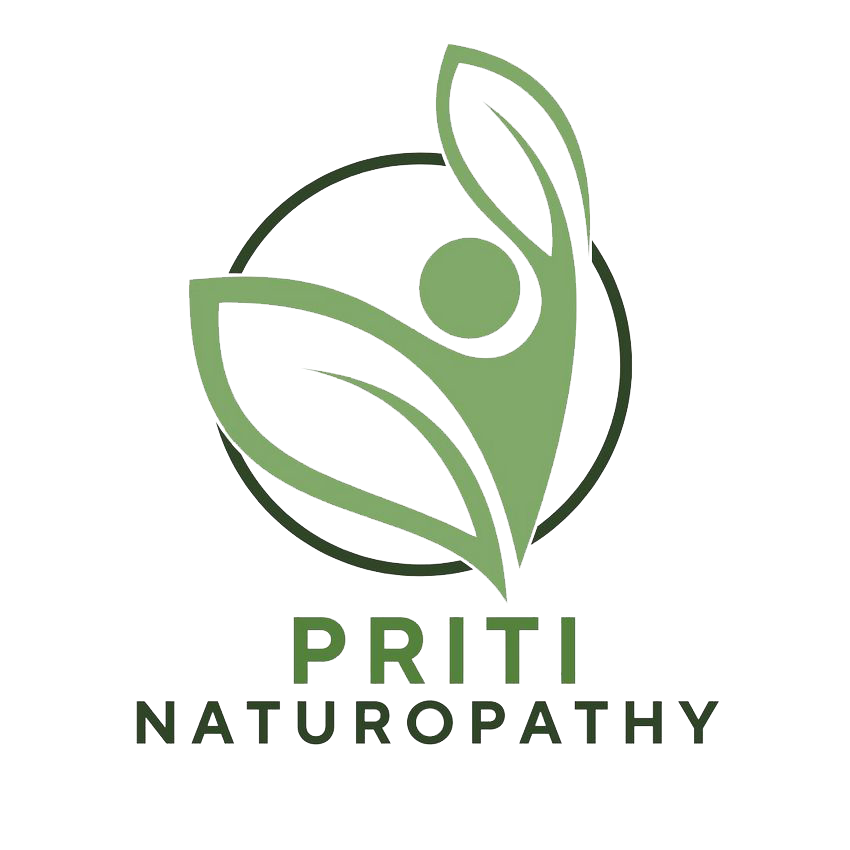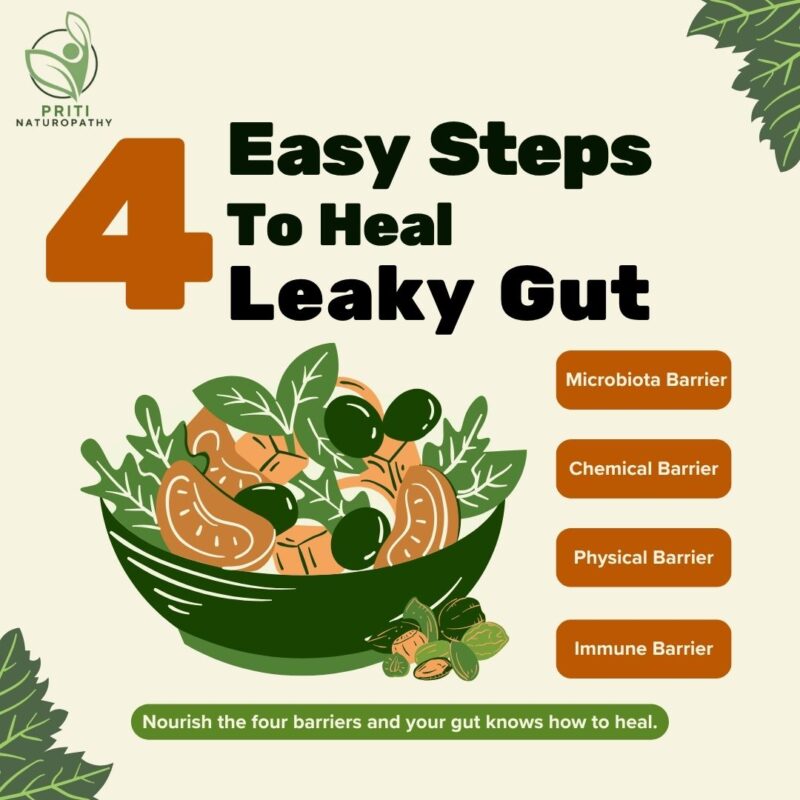Introduction
If you feel bloating, irregular bowels, skin flares, brain fog, low energy all the time, even you are eating healthy. Maybe it’s your gut lining might be asking for help. But the good news is, you don’t need complicated diets or expensive supplements.
In naturopathy, we strengthen the gut’s natural defenses in a simple, natural and healthier way.
Think of your gut as a home with four protective layers (barriers). When these barriers are strong, your digestion feels calm, your skin clears, and energy returns.
In this article I will tell you what are these four protective layers (barriers) and how you can heal them naturally with simple and easy steps.
Microbiota Barrier (Your “Good Bacteria Wall”)
Your gut microbes protect you from harmful germs, help you digest food, and make vitamins. This is the community of good bacteria living in your gut. They protect you from harmful germs, help you digest food, make vitamins and help maintain balance. When this balance is disturbed, the gut can become leaky.
Foods that naturally improves gut microbes
Add these in your daily life
- Fermented foods: plain yogurt/curd, homemade kanji, sauerkraut, kimchi, kefir
- Prebiotic fibers: ripe banana, onions, garlic, oats, cooked & cooled rice/potatoes (resistant starch)
- Plant diversity: aim for 20–30 different plant foods per week (fruits, veggies, legumes, seeds, herbs)
Tip – Add 1 fermented + 1 prebiotic food to at least two meals a day.
Chemical Barrier (Mucin—Your Gut’s Protective Coat)
This mucus layer coats and protects your gut lining, like a soft shield. If this layer becomes thin, toxins and food particles can leak into the blood.
Foods that naturally support mucin
- Oats (soaked or cooked)
- Flaxseeds & chia (soaked; make a gel)
- Okra (bhindi) and ladies’ finger soup
- Bone broth or vegetable stock (gentle, warm, soothing)
Tip – Start your day with soaked chia or flax gel (1–2 tsp in water) and include okra or oats 3–4 times a week.
Physical Barrier – The Gut Lining Cells
These are the actual cells of your gut lining, connected tightly together to prevent leakage. If they weaken, unwanted particles can pass into the bloodstream. To repair this barrier, focus on glutamine-rich foods.
Foods that naturally support gut lining
- Glutamine: cabbage, spinach, beet greens, bone broth
- Zinc: pumpkin seeds, sesame seeds, cashews, chickpeas
- Vitamin D: morning sunlight, mushrooms (exposed to sunlight), fortified foods.
Tip – Add a seed mix (pumpkin + sesame) daily, include leafy greens with lunch, and get 15–20 minutes of morning sun (as per skin tolerance).
Immune Barrier – The Body’s Defense Line
Just beneath the gut lining sits a powerful immune system that guards against harmful invaders. But if it becomes overactive, inflammation can spread throughout the body. To keep this barrier balanced, manage stress, practice meditation or yoga, and ensure 7–8 hours of good quality sleep.
How to balance naturally
- Breathwork: 5 minutes of slow breathing or Anulom-Vilom
- Yoga/Movement: gentle stretches or a 20-minute walk after meals
- Sleep hygiene: fixed sleep time, screen-off 60 minutes before bed
- Spices & herbs: turmeric + black pepper, ginger, tulsi/herbal teas.
Tip – Choose one de-stress tool for morning and one for evening and keep it consistent.
What to Reduce (for 4–6 weeks while you heal)
- Ultra-processed snacks, refined sugar, excessive alcohol
- Refined oils and deep-fried foods
- Foods you personally react to (notice patterns; keep a 7-day food-symptom diary)
Tip: You don’t need to remove everything forever. We focus on gentle removal during healing, then mindful re-introduction.
A Gentle 1-Day Starter Plan (Example)
- Morning (on waking): warm water + 1 tsp-soaked chia or flax gel
- Breakfast: oatmeal cooked in water/milk with banana + cinnamon (or poha with peanuts & coriander)
- Mid-morning: plain curd/yogurt or a small glass of kanji/kefir
- Lunch: dal + rice/quinoa + a bowl of sautéed okra or leafy greens + salad
- Evening: herbal tea (tulsi/ginger) + handful of pumpkin/sesame seed mix
- Dinner: vegetable soup (stock/broth base) + steamed veggies + paneer/tofu or khichdi
- Bedtime: 5–7 minutes slow breathing, lights out on time
FAQ
How long does gut healing take?
Healing takes time, most people feel better in 2–6 weeks but with consistency. Full healing can take longer time but please be patient and kind to yourself. It’s not an overnight process.
Do I need supplements?
It’s all depended upon your current health and condition, some people benefit from targeted supplements (e.g., vitamin D if deficient, or a high-quality probiotic). Consult with a practitioner for personalized advice.
Is “leaky gut” the same as IBS/IBD?
They both are different conditions, but gut barrier helps to support many digestive concerns. If you have IBD, celiac disease, or severe symptoms, seek personalized care.
What are the symptoms of leaky gut?
Common symptoms include bloating, gas, irregular bowel movements, food sensitivities, brain fog, constant fatigue, skin problems like eczema or acne, and sometimes joint pain. If several of these occur together, it may point to gut lining weakness.
How do I know if I have leaky gut?
There is not a single checklist to follow but patterns in your health can give clues. If you often feel digestive discomfort, react strongly to certain foods, or have unexplained inflammation in the body, it’s worth exploring gut healing. Working with a naturopath or doctor helps you understand this better.
What foods should I avoid if I have leaky gut?
Avoid ultra-processed foods, refined sugar, fried snacks, alcohol, and packaged foods with additives.
Which foods heal leaky gut the fastest?
Fermented foods like yogurt, kanji, kimchi, or sauerkraut; prebiotic fibers like bananas, onions, and garlic; glutamine-rich vegetables like cabbage and spinach; zinc-rich seeds (pumpkin, sesame); and soothing foods like oats and okra.
Does stress cause leaky gut?
Yes. Chronic stress releases hormones that disturb digestion and weaken the gut lining over time. This is why stress management, yoga, meditation, and proper sleep are as important as food when it comes to healing the gut.
When to Seek Guidance
- Unintentional weight loss, blood in stool, persistent pain/fever
- Known autoimmune conditions or multiple food reactions
- Long-term medication use (you may need an individual plan)
The Takeaway
You don’t need to chase complicated fixes. Nourish the four barriers — Microbiota, Chemical, Physical, Immune — and your gut knows how to heal. Start small, stay consistent, and let food, movement, breath, and sleep do their quiet work.
“If you’d like a personalized naturopathy plan for your gut, you can book a consultation with me at Priti Naturopathy. I’ll map your foods, routine, and stress patterns into a plan that fits your life.”


Leave a Reply